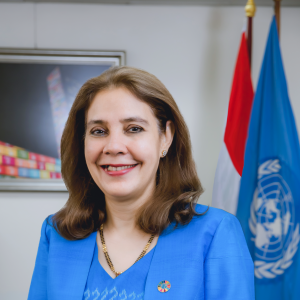- Ibu Penny Herasati, Director for Socio-Cultural Affairs and International Organization of Developing Countries, Ministry of Foreign Affairs
- Bapak Joedha Nugraha, Director of Indonesia Citizen Protection, Ministry of Foreign Affairs
- Bapak Suharyanto, Acting Director of Synchronization of Regional Government Affairs IV, Ministry of Home Affairs.
- Bapak Gede Edy Prasetya, Deputy Assistant of Capital Markets and Financial Institutions, Coordinating Ministry of Economics, Republic of Indonesia
- Bapak H.A.S. Chaidir Syam, S.IP., M.H., Regent of Maros
- Bapak Norimasa Shimomura, Resident Representatives of UNDP Indonesia
- Bapak Jeffrey Labovitz, IOM Chief of Mission in Indonesia
- Ibu Dwi Yuliawati Faiz, the Head of Programmes of UN Women Indonesia
Selamat Pagi.
It is an honor to welcome you all as we gather to discuss the strides Indonesia has made in implementing the Global Compact for Migration to protect migrant workers and ensure their welfare.
We will exchange experiences, insights, and lessons learned in implementing migration governance at both local and national levels.
This is a critical agenda as much of the world is on the move and this especially applies to Southeast Asia.
The Global Compact for Migration reflects a shared commitment by all nations to improve migration management.
Indonesia’s dedication to operationalizing these principles shows its dedication to fostering safe, orderly, and regular migration.
Migration presents a myriad of challenges within ASEAN.
These challenges have profound impacts, affecting not only the migrants themselves but also their families and communities.
In Indonesia, many migrant workers who set out in search of better opportunities may find themselves vulnerable to exploitation, discrimination and abuse.
However, remittances sent by these migrants improve the living standards of their families and contribute significantly to economic growth and sustainable development in countries of both origin and destination.
In fact, their contributions are key to speeding up progress on SDGs.
The UN, through its joint programs, is lending support led by UNDP, UN Women, and IOM.
Their work encompasses financing models, livelihoods, government policies and planning, as well as boosting access to justice at both national and local levels.
The project has contributed to three critical outcomes:
First, initiatives have strengthened migration governance in Indonesia in partnership with government and in line with national priorities.
Critical to this process have been comprehensive studies, the development of migration governance indicators, targeted training sessions, inter-ministerial forums, and dialogues on migration.
We are seeing progress with IOM’s National and Local Migration Governance Indicators and the integration of migration governance into the National Medium-Term Development Plan, led by UNDP.
As over half of our migrant workers are women, UN Women has been prioritizing their protection, including an integrated criminal justice system model and strengthening the Safe Travel Mobile application in collaboration with Kemulu.
These efforts ensure that migrant workers are better protected.
Second, the project has enhanced the capacity of government stakeholders at sub-national level to understand and maximize the development potential of migration governance.
By promoting localized training, the UN has provided essential tools for integrating migration into planning and budgeting.
This initiative ensures that government stakeholders at all levels are equipped to effectively manage and leverage migration for development.
Third, UN agencies have developed and tested innovative financing models to support returnee migrant workers as economic stakeholders.
By promoting village cooperatives and supporting the digital marketing of local produce, these initiatives have shown promising results in three provinces with the highest number of migrant workers.
These not only help returnee migrant workers reintegrate into their communities but also boost local economies by creating sustainable livelihoods and economic opportunities.
Positive impacts are evident in improved conditions and better opportunities for migrant workers.
However, there is still much work to be done.
As we move forward, it is crucial that we build on these achievements, address remaining gaps, and ensure that migration policies and practices evolve to meet new challenges.
This event is a great opportunity for stakeholders to showcase achievements, reinforcing Indonesia’s position as a champion country for the global compact in support of migration governance.
By sharing these successes, Indonesia can inspire other nations to improve migration governance and protect migrant rights.
Thank you all for your commitment to this important cause. I look forward to a fruitful day of discussions.
Terima kasih.





